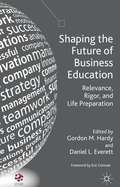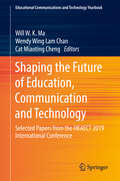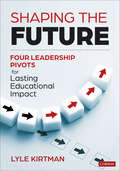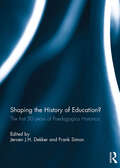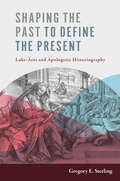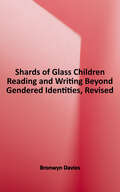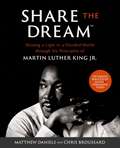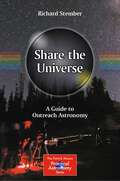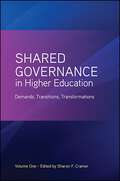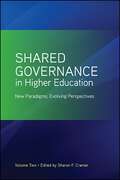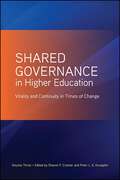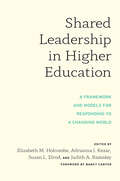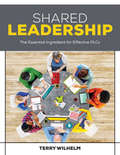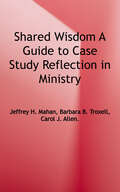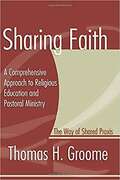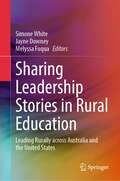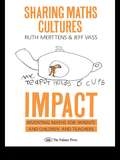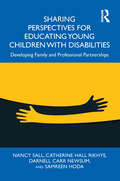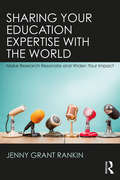- Table View
- List View
Shaping the Future of Biological Education Research: Selected Papers from the ERIDOB 2022 Conference (Contributions from Biology Education Research)
by Marcus Hammann Marcus Grace Konstantinos KorfiatisThis open access volume is a collection of full papers based on the peer-reviewed presentations accepted for the European Researchers in Didactics of Biology, ERIDOB 2022 conference. ERIDOB aims to bring together researchers in didactics of Biology from Europe and around the world to share and discuss their research work and results. It is the only major international conference whose focus lies exclusively on biology education research, and all the papers are written by international researchers from across Europe (and beyond) which report on a range of contemporary biology education research projects. They are all entirely new papers describing new research in the field. Each paper has been peer-reviewed by experienced biology education researchers and the members of the ERIDOB Academic Committee. The selected papers are collated within the following categories of biology education: · Teaching Strategies and Learning Environments · Students’ Knowledge, Conceptions, Values, Attitudes and Motivation · Outdoor and Environmental Education · Biology Teachers’ Professional Development By providing a collection of new research findings from many countries, this book is a great resource for researchers and practitioners such as school, college and university biology teachers' around the world. It is useful for training biology teachers and therefore valuable to teacher training institutions.
Shaping the Future of Business Education
by Daniel L. Everett Gordon M. HardyIn a world economy where rapid change is the only constant, what is the best way for business schools to prepare the leaders of tomorrow? The authors of this volume argue that a broad and rigorous education is needed; one that fuses business knowledge with arts and sciences, technology, and ethical training.
Shaping the Future of Education, Communication and Technology: Selected Papers from the HKAECT 2019 International Conference (Educational Communications and Technology Yearbook)
by Will W. K. Ma Wendy Wing Lam Chan Cat Miaoting ChengThis book gathers selected papers from the Hong Kong Association for Educational Communications and Technology 2019 International Conference on the theme of “Shaping the Future of Education, Communication and Technology.” It contributes to a scholarly discussion that looks beyond what future media and technology can offer for education, and reflects on best practices and lessons learned from applying new media and technology in a wide range of fields. Scholars from educational technology, communication, and higher education share their research work in various formats such as empirical research, best-practice case studies, literature reviews, etc. The topics of the papers are divided into four main areas, including curriculum, pedagogy and instructional design; teaching and learning experiences with technology; online learning and open education resources; and communication and media. The book’s unique quality is its combination of perspectives and research work on communication, education and technology. Thus, it will encourage an interdisciplinary discourse and exchange concerning communication, new media, and educational practices.
Shaping the Future: Four Leadership Pivots for Lasting Educational Impact
by Lyle KirtmanElevate your leadership to inspire lasting change and student success. Public education is facing an unprecedented crisis. Exhausted educators are leaving the profession in record numbers, while persistent systemic issues and polarizing debates distract from the core mission of education—student success. Shaping the Future offers educational leaders a compelling guide to meet these challenges head-on and transform their leadership approach to improve outcomes for students and staff alike. Grounded in original research and rich experience in over 400 school districts, Lyle Kirtman introduces four pivotal leadership shifts to align vision, leadership practices, and student success. Additional features include: Practical frameworks and real-world examples demonstrating how to overcome persistent barriers in workforce challenges and accountability Strategies to integrate diversity and social emotional learning into goals and actions for academic excellence Reflection tools, case studies, and step-by-step guidance to help you act immediately and effectively in your unique context. This book equips leaders with tools to address misalignment in improvement strategies, low morale, and the retention crisis, while reigniting a collective focus on student achievement. Shaping the Future is more than a leadership guide—it’s a solution-driven call to action for anyone dedicated to sustaining public education and unlocking the potential of every learner.
Shaping the Future: Four Leadership Pivots for Lasting Educational Impact
by Lyle KirtmanElevate your leadership to inspire lasting change and student success. Public education is facing an unprecedented crisis. Exhausted educators are leaving the profession in record numbers, while persistent systemic issues and polarizing debates distract from the core mission of education—student success. Shaping the Future offers educational leaders a compelling guide to meet these challenges head-on and transform their leadership approach to improve outcomes for students and staff alike. Grounded in original research and rich experience in over 400 school districts, Lyle Kirtman introduces four pivotal leadership shifts to align vision, leadership practices, and student success. Additional features include: Practical frameworks and real-world examples demonstrating how to overcome persistent barriers in workforce challenges and accountability Strategies to integrate diversity and social emotional learning into goals and actions for academic excellence Reflection tools, case studies, and step-by-step guidance to help you act immediately and effectively in your unique context. This book equips leaders with tools to address misalignment in improvement strategies, low morale, and the retention crisis, while reigniting a collective focus on student achievement. Shaping the Future is more than a leadership guide—it’s a solution-driven call to action for anyone dedicated to sustaining public education and unlocking the potential of every learner.
Shaping the History of Education?: The first 50 years of Paedagogica Historica
by Jeroen J.H. Dekker and Frank SimonIn 1961 the Centre for the Study of the History of Education at Ghent University, Belgium published the first issue of the multilingual journal Paedagogica Historica: International Journal of the History of Education. This book celebrates its fiftieth volume. In fourteen contributions written by different generations of historians of education, it demonstrates that in an era where the history of education at university level is at risk, both the journal and the discipline are pulsing, and alive and kicking. Was the journal a trendsetter or a follower, and which position did it take with respect to the International Standing Conference for the History of Education? These are questions addressed in the first section of this book. In the second section, a number of articles show national and transnational developments of the history of education. In their diversity, they make clear how the national and the transnational together characterize the discipline. They show why journals in this domain should stimulate the development of broader concepts and theories in order to put national and regional cases in a broader scientific context and to make them attractive for international readership. In the last section authors turn their minds to the future of the history of education. They write about the shaping of new trends and about moving beyond borders, focusing on, among other things, the challenge of neurosciences and of digital humanities.This book was originally published as a special issue of Paedagogica Historica.
Shaping the Past to Define the Present: Luke-Acts and Apologetic Historiography
by Gregory E. SterlingUncovering ancient texts and rethinking early Christian identity with the Gospel of Luke and the Acts of the ApostlesShaping the Past to Define the Present comprises both new and revised essays by esteemed New Testament scholar Gregory E. Sterling on Jewish and early Christian historiography. A sequel to his seminal work, Historiography and Self-Definition, this volume expands on Sterling&’s reading of Luke-Acts in the context of contemporary Jewish and Greek historiography. These systematically arranged essays comprise his new and revised contributions to the field of biblical studies, exploring: the genre of apologetic historiography exemplified by Josephus and Eusebiusthe context of Josephus&’s work within a larger tradition of Eastern historiographythe initial composition and circulation of Luke and Actsthe relationship of Luke-Acts to the Septuagintthe interpretation of the Diaspora in Luke-Actsthe structure of salvation history as it is manifested in Luke-Acts Socratic influences on Luke&’s portrayal of Jesus&’s deaththe early Jerusalem Christian community as depicted in Acts compared with other Hellenized Eastern traditions such as Egyptian priests and Indian sagesthe establishment of Christianity&’s &“socially respectability&” as a guiding purpose in Luke-Acts Engaging with current critical frameworks, Sterling offers readers a comprehensive analysis of early Christian self-definition through Judeo-Christian historiography.
Shards Of Glass: Children Reading And Writing Beyond Gendered Identities, Revised Edition
by Bronwyn DaviesThe author explores with primary school-age children the possibility of discovering different ways of being, as well as looking at how gender relations are resistant to change. The author is present in many ways: as a writer, child, researcher, mother, and daughter. Shards of Glass looks at the processes through which gender is constituted from a poststructuralist perspective: at the usual ways knowledge is constructed in classrooms, the nature of femininities and masculinities, and the children's experience of sexuality. The author challenges us to work with children to allow them as speaking subjects to invent, invert, and break old structures and speak/write into existence other ways of being. The new edition involves refining and developing the theoretical framework and analysis.
Share the Dream Bible Study Guide plus Streaming Video: Shining a Light in a Divided World through Six Principles of Martin Luther King Jr.
by Chris Broussard Matthew DanielsIt&’s Time to Share the Dream. . .Dr. King and the men and women around him were able to change history through the power of a dream that was not rooted in mere human principles. That dream was rooted in the love of God for all his children made in his image.Share the Dream® is a six-session video Bible study (streaming code included) based on the life and teachings of Dr. Martin Luther King, Jr. Each session revolves around one of the biblical principles that shaped Dr. King's life and motivated him to speak on behalf of African Americans in the Civil Rights Movement.Sessions and video run times:Love (24:00)Conscience (16:00)Justice (17:30)Freedom (14:30)Perseverance (15:00)Hope (17:00)Be a part of the Share the Dream® movement that's helping a new generation understand, live, experience, and form a community around the unifying principles at the heart of the dream to which Dr. King dedicated his life.This study guide has everything you need for a full Bible study experience, including:The study guide itself—with discussion and reflection questions, video notes, and a leader's guide.An individual access code to stream all video sessions online. (You don&’t need to buy a DVD!) Streaming video access code included. Access code subject to expiration after 12/31/2028. Code may be redeemed only by the recipient of this package. Code may not be transferred or sold separately from this package. Internet connection required. Void where prohibited, taxed, or restricted by law. Additional offer details inside.
Share the Universe: A Guide to Outreach Astronomy (The Patrick Moore Practical Astronomy Series)
by Richard StemberAs every astronomer knows, astronomy is one of the most approachable and inspiring of the natural sciences. It appeals to both children and adults while drawing in curious minds with its immense distances and unimaginably powerful natural phenomena. In this book, you will find out how to be a part of the journey in sharing scientific knowledge and inspiring minds of all ages. By using the affordable tools and techniques provided in this book – you will learn about how astronomers can easily engage people with views of our solar system’s planets, moons, and even more distant objects like nebulas, stellar nurseries, and remnants of exploded stars. Perhaps most importantly, the natural appeal of this science is helpful when explaining to non-scientists how science “works." What is science and scientific methodology? How is it used to give mankind knowledge and solutions to problems that we face in many scientific fields including medicine? How does it differ from other sources of information? This book, sprinkled with the author’s 24 plus years of personal experience in public outreach, offers practical techniques to engage, educate, and inspire all who are interested in the field of astronomy.
Shared Governance in Higher Education, Volume 1: Demands, Transitions, Transformations
by Sharon F. CramerShared Governance in Higher Education Set (Volumes 1, 2 and 3)For those seeking a way to change opinions of shared governance from pointless and unlikely to possible and intriguing, Shared Governance in Higher Education, Volume 1 will trigger meaningful conversations by offering valuable new perspectives. Experienced governance members, the contributors provide practical insights for everyone involved in academic governance and illuminate the subtle aspects of governance that make the difference between success or failure. Each chapter takes a different view of governing within institutions of higher education and explores topics such as engaging all stakeholders (including students) in shared governance; building on the benefits of a large, complex system; and bringing together pressing current needs with realistic strategic planning. Several in-depth descriptions of academic challenges, and the many roles of governance in addressing them, are thoughtfully explored. The contributors look both deeply and broadly, moving beyond platitudes. The result is a volume that will appeal to those beginning their terms of service as governance members or transitioning into leadership positions, as well as those looking for ways to assist others via governance symposia or conferences, and that will enable readers to shape their involvement in shared governance in unique new ways.
Shared Governance in Higher Education, Volume 2: New Paradigms, Evolving Perspectives
by Sharon F. CramerShared Governance in Higher Education Set (Volumes 1, 2 and 3) Building on the resources offered in the first volume of this series, this second volume offers governance members, leaders, and other academics valuable insights into the governance process in higher education. In a chapter drawn from his keynote address at the March 2015 SUNY Voices conference, Steven Bahls, president of Augustana College, provides a critical study of institutions of higher education. Nine additional chapters offer a thorough analysis of academic processes that are usually hidden from view, including development of a sexual assault policy, faculty review of administrators, and successful use of task forces. Contributors describe subtle considerations and compromises, which effective governance leaders can incorporate into collaborations leading to effective outcomes. Readers of this volume will better understand how to avoid pitfalls of their own, as contributors illustrate hard-earned wisdom and lessons learned. Practical insights and guidelines on leadership development, budget development involving governance leaders, and mentoring are provided. This volume will provide readers— faculty, staff, students, and administrators—with the pragmatic resources they need to recognize and resolve governance challenges on their own campuses.
Shared Governance in Higher Education, Volume 3: Vitality and Continuity in Times of Change
by Sharon F. Cramer; Peter L. K. KnuepferShared Governance in Higher Education Set (Volumes 1, 2 and 3)Shared governance impacts every member of the campus community, including faculty, staff, students, and administrators. Contributors to this volume—presenters at multiple SUNY Voices conferences on Shared Governance—explore how campus members can effectively improve the dialogue about critical issues and become better informed about the subtle, sophisticated strategies needed to move from discussion to action. Readers will gain new insights, enabling them to reexamine their own governance, both their current circumstances and possible futures. Included here are examinations of the key elements and models of shared governance, the role of faculty governance in institutional diversity and inclusion, relationship and rapport-building, and communication in times of change. Also discussed are assessment rubrics, campus and systemwide experiences, and analyses of shared governance in the accreditation process.
Shared Leadership in Higher Education: A Framework and Models for Responding to a Changing World
by Adrianna J. Kezar Nancy Cantor Judith A. Ramaley Elizabeth M. Holcombe Susan ElrodToday’s higher education challenges necessitate new forms of leadership. A volatile financial environment and the need for new business models and partnerships to address the impact of new technologies, changing demographics, and emerging societal needs, demand more effective and innovative forms of leadership. This book focusses on a leadership approach that has emerged as particularly effective for organizations facing complex challenges: shared leadership. Rather than concentrating power and authority in an individual leader at the top of an organization, shared leadership involves multiple people influencing one another across varying levels and at different times. It is a flexible, collective, and non-hierarchical approach to leadership. Organizations that have implemented shared leadership have been better able to learn, innovate, perform, and adapt to the types of external challenges that campuses now face and that will continue to shape higher education in the future. This book brings together the two foremost scholars of higher education who have studied, described and evaluated the impact of shared leadership, a university chancellor with prior experience of facilitating systemic institutional change at two university systems, and the former president of three universities where she coordinated processes that led to the transformational changes needed renew institutional mission and purpose. Opening with four chapters that define the nature of shared leadership, describe its key characteristics, and how to build institutional capacity, the book then presents ten institutional cases. Ranging from institution-wide initiatives at four year colleges and a community college, to examples of managing change in a college, a center, and across STEM departments, the contributing authors describe the context and drivers of the need for change, the building of shared vision to create coalitions, lessons learned, and outcomes. Intended as a resource for leaders at the highest levels such as Presidents and Provosts as well as mid-level leaders such as deans, directors, and department chairs, the book is also addressed to faculty and staff who are interested in collaborating with campus leaders on institutional decision-making or creating new change initiatives. It is intended to build capacity for shared leadership across institutions and for use in leadership courses and programs.
Shared Leadership: The Essential Ingredient for Effective PLCs
by Terry WilhelmSupercharge your school culture with authentic shared leadership. Why do so many professional learning communities (PLCs) fail? Terry Wilhelm answers this question—and more—by challenging educators to work together once and for all to cultivate shared leadership. Through simple practices and processes, Shared Leadership: The Essential Ingredient for Effective PLCs highlights approaches that spark and sustain a successful PLC. If you need how-to steps to fuel a healthy school culture in curriculum, instruction, and assessment, it’s all here: Developing teacher leadership and enhancing collaboration Discussion protocols to fire up team meetings Tools and troubleshooting tips Common scenarios and dilemmas
Shared Leadership: The Essential Ingredient for Effective PLCs
by Terry WilhelmSupercharge your school culture with authentic shared leadership. Why do so many professional learning communities (PLCs) fail? Terry Wilhelm answers this question—and more—by challenging educators to work together once and for all to cultivate shared leadership. Through simple practices and processes, Shared Leadership: The Essential Ingredient for Effective PLCs highlights approaches that spark and sustain a successful PLC. If you need how-to steps to fuel a healthy school culture in curriculum, instruction, and assessment, it’s all here: Developing teacher leadership and enhancing collaboration Discussion protocols to fire up team meetings Tools and troubleshooting tips Common scenarios and dilemmas
Shared Wisdom: A Guide to Case Study Reflection in Ministry
by Jeffrey H. Mahan Barbara B. Troxell Carol J. AllenThree authors well-acquainted in the area of field education evaluate events in ministry using case-study analysis. They outline the case process—preparing, presenting, and discussing a case—and analyze the implications of the process. Each chapter offers a biblical image which connects the case process with the dynamic Christian tradition. Readers will learn techniques for writing case studies and will come to understand how to use imagination and analogy to provoke theological reflection.
Sharing Breath: Embodied Learning and Decolonization
by Sheila Batacharya Yuk-Lin Renita WongTreating bodies as more than discursive in social research can feel out of place in academia. As a result, embodiment studies remain on the outside of academic knowledge construction and critical scholarship. However, embodiment scholars suggest that investigations into the profound division created by privileging the mind-intellect over the body-spirit are integral to the project of decolonization. The field of embodiment theorizes bodies as knowledgeable in ways that include but are not solely cognitive. The contributors to this collection suggest developing embodied ways of teaching, learning, and knowing through embodied experiences such as yoga, mindfulness, illness, and trauma. Although the contributors challenge Western educational frameworks from within and beyond academic settings, they also acknowledge and draw attention to the incommensurability between decolonization and aspects of social justice projects in education. By addressing this tension ethically and deliberately, the contributors engage thoughtfully with decolonization and make a substantial, and sometimes unsettling, contribution to critical studies in education.
Sharing Christ (Experiencing Christ Together)
by Karen Lee-Thorp Todd Wendorff Brett Eastman Dee Eastman Denise Wendorff"Everyone knows what it feels like to be lost. But for many people, being lost is a way of life. Sharing Christ Together teaches students how to give lost people directions. Six sessions give kids the tools they need to talk about Jesus with their friends, family, and the world: • The Father’s Heart: How do I make evangelism a passionate extension of my relationship with God? • Christ in Flesh and Blood: When it comes to evangelism, what does it mean to be the body of Christ? • Sowing Seeds: How did Jesus actually spread the good news? • Who Is My Neighbor? How and why is it important to share Jesus with people who are from different cultures? • Teaming Up: Why did Jesus say to go out in pairs? What does that have to do with how I talk to people about Jesus? • Up a Tree: What do I do when I encounter people who make me uncomfortable? Sharing Christ Together will fill your student’s hearts with Jesus and allow them to share the love they’ve experienced with those who need a savior. "
Sharing Digital Photos For Dummies, Pocket Edition
by Julie Adair King Barbara Obermeier Mark Justice HintonShare your favorite digital photos with family and friends Do you have a collection of great vacation shots just waiting to impress your friends? Or critical photos you must get to yourbusiness associates? This book shows you all the differentoptions for sharing your photos with a few or a lot of people — quickly, easily, and even for free! Open the book and find: Tips for e-mailing photos Insights on posting to photo-sharing sites and blogs Steps for getting the best results from a scanner How to create a photo slide show or video Digital picture frame advice
Sharing Faith: A Comprehensive Approach to Religious Education and Pastoral Ministry The Way of Shared Praxis
by Thomas GroomeProvides a comprehensive introduction to all aspects of religious education and pastoral ministry and gives an in-depth inquiry into the philosophical, educational and theological theories for sharing faith.
Sharing Leadership Stories in Rural Education: Leading Rurally across Australia and the United States
by Simone White Jayne Downey Melyssa FuquaThis book brings together the two fields of ‘educational leadership’ and ‘rurality’ and builds on the growing field of inquiry into the significance of ‘adding the rural’ to all aspects of education. It explores the vibrancy and variety of opportunities and challenges that are met by rural education leaders and researchers from two particular countries, Australia and the United States. It illuminates and explores the concept of rural leadership and take an educational stance, shedding light into what it means to lead rurally for educational policy, research, schools, communities and for the next generation of rural leaders themselves. It presents stories from the field with insights into capabilities, approaches, models and strategies for improving practice and outcomes. In addition to adding to the international bodies of knowledge, this volume contributes to advancements in educational leadership theories, as well as expands understanding of requisite knowledge and skills as informed by the distinct circumstances and affordances of rural contexts. This book also explores the construct of service, and explores ways in which it has been infused in various rural education leadership contexts.
Sharing Maths Cultures: Inventing Maths For Parents And Children And Teachers
by Ruth Merttens Jeff VassFirst published in 1990. Routledge is an imprint of Taylor & Francis, an informa company.
Sharing Perspectives for Educating Young Children with Disabilities: Developing Family and Professional Partnerships
by Nancy Sall Catherine Hall Rikhye Darnell Carr Newsum Samreen HodaThis important book is an exploration of the ways parents, teachers and academics view the development and schooling of young children with disabilities. It offers an in-depth examination of the common and critical issues that emerge as children and their families first enter the school system, navigate the educational landscape and learn to advocate for their rights. Each chapter of the book presents a parent’s perspective of significant issues, followed by a teacher’s perspective. From their stories, numerous themes are identified and connected to the academic literature. The experiences shared and the literature reviewed address the challenges, successes and opportunities for increased understanding that emerge as parents and educators work together toward a common goal. Sharing Perspectives for Educating Young Children with Disabilities is essential reading for all pre-service and in-service early childhood and special education professionals and parents engaging in the process of listening carefully to others with the aim of supporting the education of young children.
Sharing Your Education Expertise with the World: Make Research Resonate and Widen Your Impact
by Jenny Grant RankinThis highly practical guide helps education experts of all levels share their knowledge, work, and research beyond their own field and colleagues. By pursuing the recommendations in this book, educators and researchers can increase the exposure of their ideas and impact more students’ lives (this also enhances readers’ CVs and careers). Chapters cover the most effective and efficient ways to share readers’ expertise with the world, such as: Branding (crafting your pitch and leveraging social media) Writing (landing book deals and succeeding in key writing opportunities) Speaking (giving TED Talks, delivering conference keynote presentations, appearing on NPR, landing interviews, and contributing to public dialogue) Participating and serving (making connections, influencing policy, and joining panels or advisory boards) Honors (winning awards and recognition to expand your platform) Rich in tips, strategies, and guidelines, this book also includes downloadable eResources that provide links, leads, and templates to help secure radio broadcasts, podcasts, conferences, and other publication opportunities.

